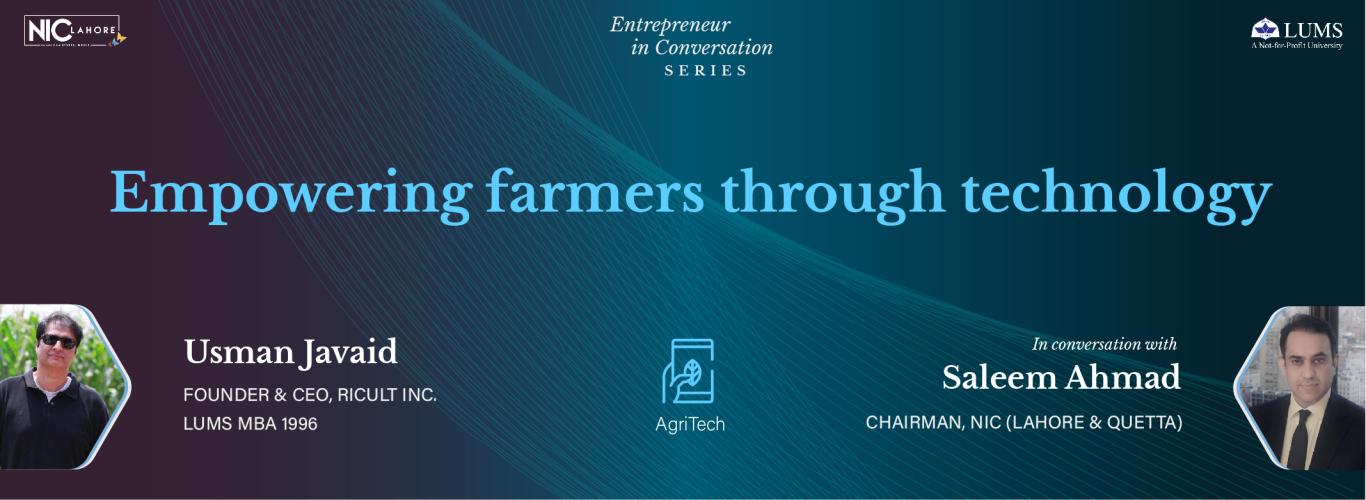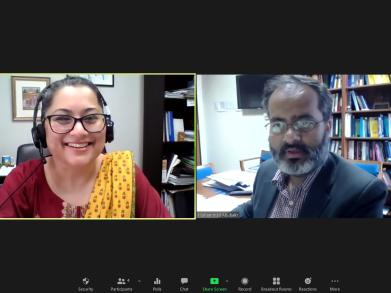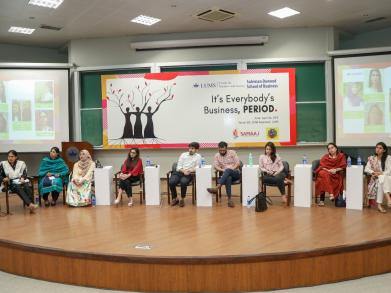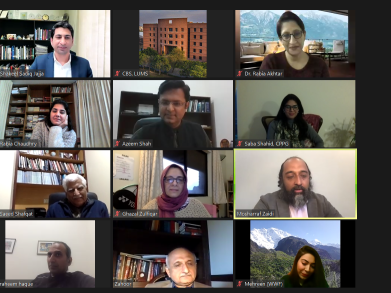NIC Kicks-off ‘Entrepreneur in Conversation’ Series with Usman Javaid, CEO Ricult
National Incubation Centre Lahore's (NICL) inaugural ‘Entrepreneur in Conversation’ series session with Usman Javaid, CEO of Ricult, honed in on the use of data analytics to support financial inclusion for the smallholder farmer in Pakistan and Thailand.
Through the ‘Entrepreneur in Conversation’ series, NICL is aiming to provide young entrepreneurs a platform to engage directly with industry leaders and learn firsthand from their start-up journeys. “We hope that these informal and interactive sessions will serve as an opportunity to learn from entrepreneurs who are solving Pakistan’s big problems, and thereby creating lasting impact. In the process, we hope to inspire a generation of young problem solvers, who can learn from entrepreneurs like Usman, and can learn from their failures, their challenges, and successes and move the country forward,” shared Mr. Saleem Ahmad, Chairman NICL.
Ricult is transforming the agriculture sector by helping farmers escape the cycle of poverty. “We exist to help the underprivileged, which is the farmers, to make a better living,” says Usman. “Hence, we qualify as a double bottom line company, where not only are we a for-profit organisation but at the same time we are also creating positive social impact that helps people move up the socioeconomic ladder. The farmers we’ve worked with have seen an increase in revenue, increase in yield and an increase in their disposable income.”
A LUMS and MIT graduate, Usman worked with organisations like Engro, Nestle and Telenor, where he had the opportunity to closely interact with the farming community in Pakistan and understand their challenges. While working with the team that created EasyPaisa, he observed how basic technology could be used to create social impact for a large number of people. That led him to pursue a second MBA at MIT, where he met his co-founders, and thus Ricult was born.
The statistics are not very promising with regards to global food security. The world will have to produce 60% more food by 2050; the situation is even more dire for Pakistan, which is currently 76th out of 107 countries in the Global Food Security Index. With a growing population, and the inefficiencies that exist in the current supply chains, there is a need for AI/Machine Learning to provide actionable insights to multiple stakeholders to improve supply chain and productivity.
In a short amount of time, Ricult has partnered with leading names in the agriculture industry in Pakistan as well as Thailand, including Habib Bank, Bank Al Falah, Engro, Dupont, Jazz, and WWF. Currently the company is focused on helping farmers connect with mainstream services, and financial institutions so they can easily access more affordable credit. They also have a farmers app, and are working towards an IVR solution, which will help connect different stakeholders within the agriculture ecosystem and provide relevant insights, all through a mobile phone.
Usman also highlighted the importance of start-ups to pivot as soon as they think they need to. “When we started Ricult, we realised that 95% of transactions in the agricultural space happen on credit, and identified that the two key problems in the sector were access to affordable credit and access to information. So, we pivoted our company to try to address these problems.”
The QnA demonstrated the immense value interactions with leading entrepreneurs like Mr. Javed can have. In response to a question by the NIC cohort, he pushed start-ups to focus on their business so that they can look at investors as strategic partners, “Put yourself in a situation where you don’t become desperate. You need to focus on the product and the users. If you have traction, you have users, so more investors will want to work with you. If you don’t have traction or a product, an investor or two might talk to you, but the terms they will give you will be skewed towards them, not you.”
He also suggested start-ups not to try doing it all on their own, but outsource the technology part of their product, if that’s not their forte, and build a strong advisory board which will provide them with guidance and support in different areas.
At the end of the session, Mr. Javaid urged young entrepreneurs to seriously consider the agriculture industry as a destination ripe for innovative products and services, “When I say that Pakistan is in real trouble when it comes to agriculture, I actually mean it. It’s not something we can brush under the carpet. So, my parting comments would be that I strongly encourage start-ups to focus on this and will repeat Ricult’s tagline; the people who feed us, need us.”











